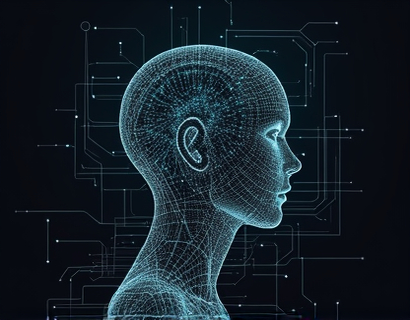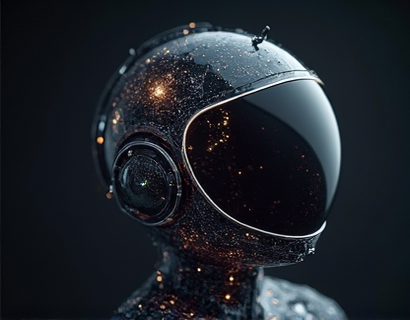Personalized AI Companions: Revolutionizing Childhood Creativity and Emotional Well-Being
In today's digital age, the landscape of childhood play and emotional development is undergoing a significant transformation. Personalized AI companions, often referred to as interactive digital friends, are emerging as innovative tools that can enhance children's creativity and emotional well-being. These AI-driven imaginary friends provide personalized, interactive companionship that fosters imaginative play and social skills in a safe digital space. This article explores how these digital companions are revolutionizing the way children engage with their creativity and emotions.
The Role of Imagination in Childhood Development
Imagination is a crucial component of childhood development. It allows children to explore their thoughts, feelings, and the world around them. Through imaginative play, children learn to express themselves, solve problems, and develop social skills. Traditional forms of imaginative play, such as role-playing with toys or creating stories, have long been recognized for their benefits. However, the introduction of AI companions takes this concept to a new level, offering children a unique and personalized experience that can adapt to their individual needs and preferences.
Understanding AI Companions
AI companions are digital entities designed to interact with children in a meaningful way. These companions can take various forms, from animated characters to virtual pets, and are equipped with advanced algorithms that allow them to learn and adapt to a child's personality and interests. By engaging in conversations, playing games, and providing emotional support, these AI friends can create a rich and immersive environment for children to explore their creativity.
How AI Companions Foster Creativity
One of the most significant benefits of personalized AI companions is their ability to foster creativity in children. Here are several ways in which these digital friends encourage imaginative play:
- Interactive Storytelling: AI companions can co-create stories with children, allowing them to take the lead in narrative development. This interactive storytelling experience encourages children to think critically and creatively as they build their own worlds and characters.
- Artistic Expression: Many AI companions offer tools for artistic expression, such as drawing or music creation. By providing a platform for children to express themselves creatively, these companions help nurture their artistic talents.
- Problem-Solving Challenges: AI companions can present children with challenges that require creative problem-solving. By encouraging children to think outside the box, these challenges promote cognitive development and innovative thinking.
- Role-Playing Scenarios: AI companions can simulate various scenarios that allow children to role-play different characters and situations. This type of play not only enhances creativity but also helps children understand different perspectives and emotions.
Supporting Emotional Well-Being
In addition to fostering creativity, personalized AI companions play a vital role in supporting children's emotional well-being. Here are some ways these digital friends contribute to healthy emotional development:
- Emotional Support: AI companions can provide a non-judgmental space for children to express their feelings. By engaging in conversations about emotions, children can learn to articulate their thoughts and feelings more effectively.
- Building Resilience: Through interactive scenarios, AI companions can help children navigate challenges and setbacks. By modeling resilience and problem-solving strategies, these companions teach children how to cope with difficulties in a safe environment.
- Social Skills Development: AI companions can simulate social interactions, allowing children to practice their social skills in a low-pressure setting. This practice can help children build confidence in their ability to communicate and connect with others.
- Encouraging Empathy: By engaging with AI companions that exhibit various emotions and personalities, children can develop a greater understanding of empathy. This understanding is crucial for building healthy relationships with peers.
Creating a Safe Digital Space
As technology becomes increasingly integrated into children's lives, concerns about safety and screen time have grown. Personalized AI companions are designed with these concerns in mind, providing a safe digital space for children to explore their creativity and emotions. Here are some key features that contribute to a secure environment:
- Parental Controls: Many AI companion platforms offer robust parental controls that allow guardians to monitor interactions and set appropriate boundaries. This feature ensures that children engage with their companions in a safe manner.
- Age-Appropriate Content: AI companions are programmed to provide age-appropriate content, ensuring that children are exposed to suitable material that aligns with their developmental stage.
- Privacy Protections: Developers prioritize user privacy, implementing measures to protect children's data and ensure that interactions remain confidential.
- Positive Reinforcement: AI companions often use positive reinforcement techniques to encourage desirable behaviors and emotional expression, promoting a healthy digital experience.
Enhancing Social Skills Through Interaction
Social skills are essential for children's overall development, and personalized AI companions can play a significant role in enhancing these skills. By providing opportunities for interaction, these digital friends help children practice and refine their social abilities. Here are some ways AI companions contribute to social skills development:
- Conversational Practice: AI companions engage children in conversations, allowing them to practice their communication skills. This interaction helps children learn how to express themselves clearly and listen actively.
- Conflict Resolution: Through role-playing scenarios, AI companions can simulate conflicts that children may encounter in real life. By guiding children through conflict resolution strategies, these companions teach valuable lessons about negotiation and compromise.
- Teamwork Activities: Many AI companions offer collaborative activities that require teamwork. By working together with their digital friends, children learn the importance of cooperation and collaboration.
- Understanding Social Cues: AI companions can model social cues and appropriate responses, helping children recognize and interpret non-verbal communication. This understanding is crucial for building strong relationships with peers.
Encouraging Lifelong Learning
Personalized AI companions not only support creativity and emotional well-being but also encourage a love for learning. By providing engaging and interactive experiences, these digital friends can inspire children to explore new subjects and interests. Here are some ways AI companions promote lifelong learning:
- Curiosity-Driven Exploration: AI companions can introduce children to new topics and ideas, sparking their curiosity and encouraging them to ask questions. This exploration fosters a love for learning that can last a lifetime.
- Gamified Learning: Many AI companions incorporate gamification elements into their interactions, making learning fun and engaging. By turning educational content into games, children are more likely to retain information and develop a positive attitude toward learning.
- Personalized Learning Paths: AI companions can adapt to a child's learning style and pace, providing personalized learning experiences that cater to their individual needs. This tailored approach helps children feel more confident in their abilities.
- Encouraging Critical Thinking: Through interactive challenges and problem-solving activities, AI companions promote critical thinking skills. By encouraging children to analyze situations and make decisions, these companions help develop essential cognitive abilities.
The Future of AI Companions in Childhood Development
As technology continues to evolve, the potential for personalized AI companions in childhood development is vast. Future advancements may lead to even more sophisticated interactions, allowing these digital friends to provide deeper emotional support and creative engagement. Here are some potential developments on the horizon:
- Enhanced Emotional Intelligence: Future AI companions may be equipped with advanced emotional recognition capabilities, allowing them to respond more effectively to a child's emotional state. This enhancement could lead to more meaningful interactions and support.
- Integration with Augmented Reality: The integration of AI companions with augmented reality (AR) technology could create immersive experiences that blend the digital and physical worlds. This combination could further enhance imaginative play and creativity.
- Collaborative Learning Environments: AI companions may evolve to facilitate collaborative learning experiences among groups of children, promoting teamwork and social interaction in a digital setting.
- Cross-Platform Interactions: Future AI companions may be able to interact across various devices and platforms, providing a seamless experience for children as they engage with their digital friends in different contexts.
Conclusion
Personalized AI companions are revolutionizing childhood creativity and emotional well-being by providing interactive digital friends that foster imaginative play and social skills. These AI-driven companions offer a safe space for children to explore their thoughts and feelings while enhancing their creativity and emotional intelligence. As technology continues to advance, the potential for these digital friends to support children's development is limitless. By embracing the power of personalized AI companions, parents and guardians can help nurture their children's creativity and emotional well-being in an increasingly digital world.











































